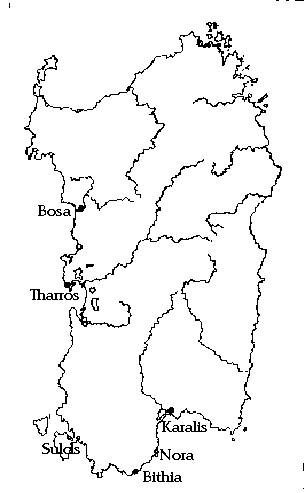Deutsch |
The Phoenicians |
Italiano |
||||||||||
![]()
 From the 9th century, the
Phoenicians extended their commerce through the Western Mediterranean, above all along the
Iberian Peninsular, from which they exploited the silver and lead mines.
From the 9th century, the
Phoenicians extended their commerce through the Western Mediterranean, above all along the
Iberian Peninsular, from which they exploited the silver and lead mines.
Given that they made rather long voyages, they needed to stop off along the way to
replenish their provisions, to take refuge from storms, and to repair the inevitable
damage to their ships. Therefore they established colonies in places that were easy to
land at and sheltered from the winds, like the coast of North Africa, the Iberian
Peninsular, Sicily and Sardinia.
The most important Phoenician colony in the Western Mediterranean was at Carthage, in
present day Gulf of Tunis, but there were many others: Ibiza, on the Archepelago of
Baleari, Cartagena on Spains Mediterranean coast, Cadiz and Tangier, at the mouth of the
Strait of Gibraltar.
In the 8th century BC they founded colonies in Sardinia: Karalis, Nora, Bithia (near Cape
Spartivento), Sulcis (on the island of Sant'Antioco), Tharros and Bosa.
Founded as ports of call, the Sardinian colonies became centers of commerce amongst the
local people, who were peaceful and friendly towards the Phoenicians. In fact the
Sardinians lived far from the coast, and farmed the land, and raised their animals.
Therefore they had no reason to be enemies with the Phoenicians, whose only interest was
the ports for their shipping.
The colonies of the South and West quickly flourished into city states with all the
commercial activity. It is thought that the Phoenicians in Sardinia exploited the salt
(which they used to preserve their fish), the coral, the tuna and sardines.
Search made by the
Class 2�C - Intermediate school "B. Croce" of Pula - Year 1997/98
Translated by Rocco Dimase
![]()
